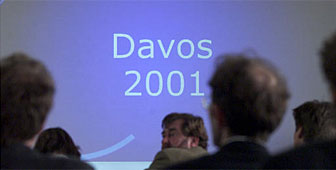Concerns over global economy to top Davos agenda

When the Swiss president, Moritz Leuenberger, opens the 31st annual World Economic Forum summit in Davos on January 25, more than 3,000 delegates will settle down to set the economic agenda for the coming year.
This year’s summit will concentrate on how to maintain global economic growth and how to alleviate inequalities between rich and poor.
With the title “Sustaining Growth and Bridging the Divides”, the Forum will try to answer critics who dismiss it as little more than a rich men’s club.
The summit will discuss the recent economic slowdown in the United States and what measures should be taken by the new Bush administration to achieve a soft landing.
Recent economic data from the US as well as company profit warnings and falling stock markets have led to concerns that the prolonged period of US growth is coming to an end.
Some economists are worried that the US is heading for recession and that the economies of Europe and Asia may suffer as a consequence.
The Forum will also continue a debate initiated last year about how to share the benefits of globalisation and the technological revolution with poorer countries.
“Just as the new economy is not what people thought it would be, globalisation is not what it should be,” says the Forum’s Managing Director, Claude Smajda.
He says globalisation has so far failed to rid the world of inequalities in health, education and access to new technologies. “Without strong growth, there will not be social progress,” he adds.
Apart from Leuenberger, other Swiss ministers in attendance will be the Foreign Minister, Joseph Deiss, and the Economics Minister, Pascal Couchepin.
They will rub shoulders with top political and economic leaders from around the globe.
Japan’s prime minister, Yoshiri Mori, the Mexican president, Vincente Fox, and the Yugoslav president, Vojislav Kostunica, are among those attending.
Germany’s foreign minister, Joschka Fischer, is also expected, along with the French finance minister, Laurent Fabius and the Russian vice-premier, Alexei Kudrin.
Africa is better represented than ever before with the presidents of Nigeria, South Africa and Senegal attending.
Heads of the world’s central banks, corporate chiefs and officials from the World Bank and the International Monetary Fund will be there, too.
And in keeping with the friendlier image it is keen to portray, the World Economic Forum will also welcome more NGOs (non-governmental organisations) than ever before. Their number will rise from 51 in 2000 to more than 70.
No officials from the new Bush administration are expected although Forum officials are trying to set up video conferencing facilities to link up with Washington.
The Forum runs until January 30.
by Michael Hollingdale

In compliance with the JTI standards
More: SWI swissinfo.ch certified by the Journalism Trust Initiative
You can find an overview of ongoing debates with our journalists here. Please join us!
If you want to start a conversation about a topic raised in this article or want to report factual errors, email us at english@swissinfo.ch.